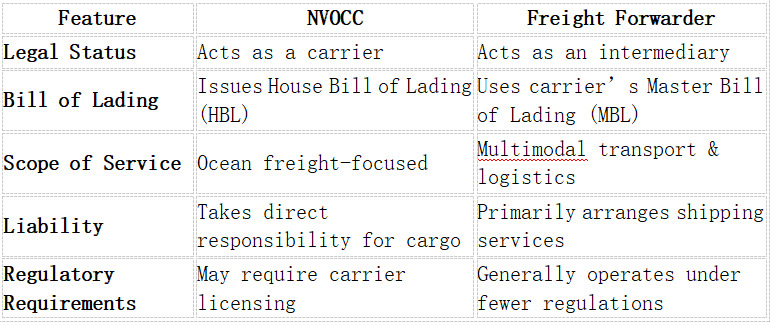When managing international shipments, businesses often need to decide whether to work with an NVOCC (Non-Vessel Operating Common Carrier) or a Freight Forwarder. While both facilitate cargo movement, their roles, responsibilities, and legal obligations differ. This article explores how to choose the right option based on your shipping requirements.
1. Understanding the Role of an NVOCC
An NVOCC acts as a carrier without operating its own vessels. It buys cargo space from shipping lines, consolidates shipments, and issues its own House Bill of Lading (HBL). NVOCCs are often responsible for cargo throughout the journey, making them a reliable choice for companies looking for direct ocean freight solutions.
When to Choose an NVOCC:
· You need a single point of contact for your ocean freight.
· You want to work with a carrier that can issue its own HBL.
· Your business involves frequent Full Container Load (FCL) or Less than Container Load (LCL) shipments.
2. What Does a Freight Forwarder Do?
A freight forwarder coordinates end-to-end logistics, handling multimodal transportation, customs clearance, warehousing, and documentation. Unlike an NVOCC, a freight forwarder does not act as a carrier but instead arranges shipments with various carriers to provide the best shipping solutions.
When to Choose a Freight Forwarder:
· You require customs clearance, warehousing, and value-added logistics services.
· Your shipments involve multiple transport modes (ocean, air, rail, trucking).
· You need flexible carrier options rather than working with a single provider.
3. Comparing NVOCC and Freight Forwarder – Key Differences

Some companies operate as both an NVOCC and a freight forwarder, allowing them to offer comprehensive shipping solutions.
4. Making the Right Choice for Your Business
· If your business relies heavily on ocean freight, working with an NVOCC ensures a direct, carrier-like experience.
· If you need a complete supply chain solution, a freight forwarder provides greater flexibility and multimodal options.
Both services have their advantages, and many companies use a combination of NVOCC and freight forwarder services to optimize costs and efficiency.
5. Final Thoughts
Choosing between an NVOCC and a freight forwarder depends on your shipping priorities. If you need a carrier-like service that directly manages ocean freight, an NVOCC may be the right fit. If you require a comprehensive logistics solution, a freight forwarder is the better option. Understanding their differences allows businesses to make informed decisions and improve their supply chain strategies.






